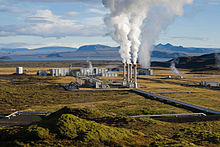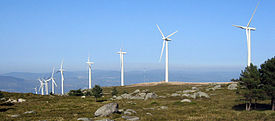- Renewable resource
-
Renewable energy Biofuel
Biomass
Geothermal
Hydroelectricity
Solar energy
Tidal power
Wave power
Wind powerA renewable resource is a natural resource with the ability of being replaced through biological or other natural processes and replenished with the passage of time. Renewable resources are part of our natural environment and form our eco-system.
In 1962, within a report to the committee on natural resources which was forwarded to the President of the United States, Paul Weiss defined Renewable Resources as: "The total range of living organisms providing man with food, fibers, drugs, etc...".[1]
Renewable resources are endangered by industrial developments and growth. They must be carefully managed to avoid exceeding the natural world's capacity to replenish them. A life cycle assessment provides a systematic means of evaluating renewability. This is a matter of sustainability in the natural environment.
Solar radiation, tides, winds, geothermal, biomass and other natural elements are renewable resources of energy now called renewable energies.
Gasoline, coal, natural gas, diesel and other commodities derived from fossil fuels, as well as minerals like copper and others, are non-renewable resources without a sustainable yield.
Contents
Renewable energy
Main article: Renewable energySolar energy is the energy derived directly from the Sun, and is the most abundant source of energy on Earth. The fastest growing type of alternative energy, increasing at 50 percent a year, is the photovoltaic cell, which converts sunlight directly into electricity.[2] The Sun yearly delivers more than 10,000 times the energy that humans currently use.[3]
Wind power is derived from uneven heating of the Earth's surface from the Sun and the warm core. Most modern wind power is generated in the form of electricity by converting the rotation of turbine blades into electrical currents by means of an electrical generator. In windmills (a much older technology) wind energy is used to turn mechanical machinery to do physical work, like crushing grain or pumping water.
Hydropower is energy derived from the movement of water in rivers and oceans (or other energy differentials), and can likewise be used to generate electricity using turbines, or can be used mechanically to do useful work. It is a very common resource. Hydropower appeared centuries ago with the first use of a power turbine to produce electricity.[4]
Geothermal power comes the Greek words, "geo" meaning Earth and "thermal" meaning heat. Geothermal directly harnesses the natural flow of heat from the ground. The available energy from natural decay of radioactive elements in the Earth's crust and mantle is approximately equal to that of incoming solar energy. The first geothermal power station was built at Landrello, Italy. Other countries that have geothermal power stations are Japan, Iceland, the Philippines and the United States. In Iceland, geothermal energy is used for electricity and heat. [5]
Alcohol derived from corn, sugar cane, switchgrass, etc. is also a renewable source of energy. Similarly, oils from plants and seeds can be used as a substitute for non-renewable diesel. Methane is also considered as a renewable source of energy.
Renewable resources such as solar energy, wind, hydropower, and geothermal energy have many benefits. These resources can reduce carbon dioxide emission, water consumption, and waste. Clean air is vital on this planet because it can reduce human health problems such as asthma (children are at a higher risk) and lung disease. Renewable resources can also lead to environment sustainability because these resources will not be depleted and stimulate the economy by creating more job opportunities. [6]
Renewable materials
Further information: bioplastics and bioasphaltAgricultural products
Techniques in agriculture which allow for minimal or controlled environmental damage qualify as sustainable agriculture, and it is also known as sustainable farming. Products (foods, chemicals, biofuels, etc.) from this type of agriculture may be considered "sustainable" when processing, logistics, etc. also have sustainable characteristics.
Biomass
Biomass comes from renewable organic materials such as resides from agriculture, like crops, animal waste and even human waste and industrial sectors of wood manufacture and food industries. Biomass is available everywhere, making its supply unlimited.It helps to sustain climate change, increase energy efficiency, and decrease greenhouse gas emission. [7]
Water
Further information: Water resourcesWater can be considered a renewable material (also non-renewable) when carefully controlled usage, treatment, and release are followed. If not, it would become a non-renewable resource at that location. For example, groundwater is usually removed from an aquifer at a rate much greater than its very slow natural recharge, and so groundwater is considered non-renewable. Removal of water from the pore spaces may cause permanent compaction (subsidence) that cannot be renewed.
See also
- Conservation movement
- Ecology
- Environmentalism
- Environmental protection
- Global warming
- Habitat conservation
- Natural capital
- Natural resource
- Recycling
- Resource
- Seed tree
- Stewardship
- Sustainable development
- Scarcity
- Zero carbon city
References
- ^ "Renewable Ressources, a report to the committee on natural resources"; by Paul Weiss chairman of renewable ressources study, 1962, National Academy of Science, National Research Council, Washington D.C., USA.
- ^ "The Power and the Glory." The Economist 21 June 2008: 6.
- ^ Sawin, Janet. "Charting a New Energy Future." State of the World 2003. By Lester R. Brown. Boston: W. W. Norton & Company, Incorporated, 2003.
- ^ http://www.solarcompanies.com/facts_about_hydropower
- ^ http://www.darvill.clara.net/altenerg/geothermal.htm
- ^ http://www.ucsusa.org/clean_energy/technology_and_impacts/impacts/public-benefits-of-renewable.html
- ^ http://www.nrel.gov/learning/re_biomass.html
Further reading
- Sawin, Janet. "Charting a New Energy Future." State of the World 2003. By Lester R. Brown. Boston: W. W. Norton & Company, Incorporated, 2003.
- Krzeminska, Joanna, Are Support Schemes for Renewable Energies Compatible with Competition Objectives? An Assessment of National and Community Rules, Yearbook of European Environmental Law (Oxford University Press), Volume VII, Nov. 2007, p. 125
Categories:- Resources
- Natural resources
- Renewable resources
Wikimedia Foundation. 2010.


